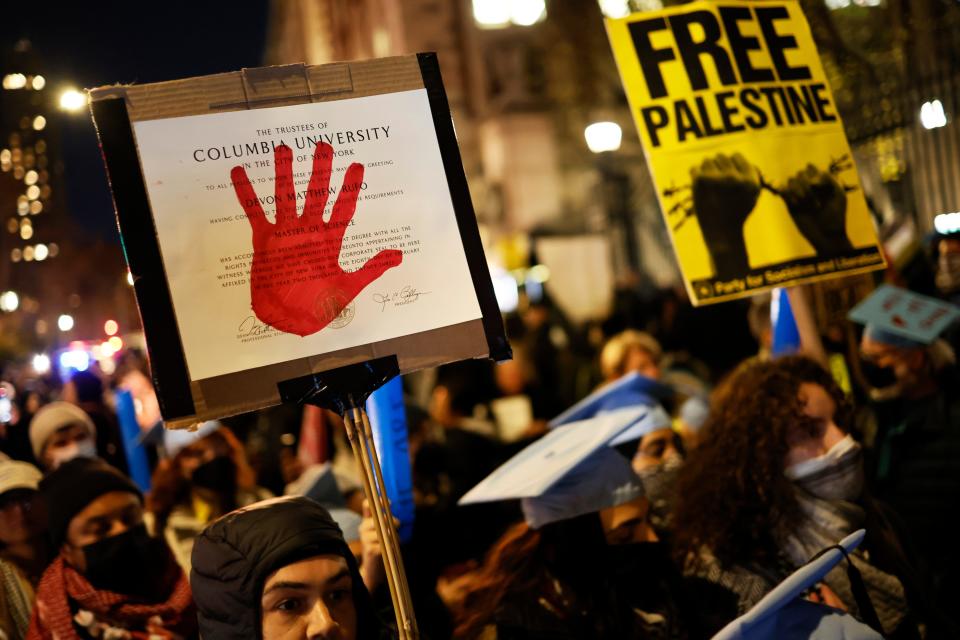Columbia University's president agrees to congressional hearing over campus antisemitism
The president of Columbia University in New York City has agreed to face the same congressional committee whose aggressive questioning last fall about campus antisemitism ultimately took down the presidents of Harvard and the University of Pennsylvania.
Minouche Shafik plans to testify in front of the House education panel in mid-April, the committee said Monday. She will be joined by David Greenwald and Claire Shipman, the co-chairs of the university’s board of trustees.
Also on Monday, two civil liberties groups filed a lawsuit in New York County Supreme Court against the Ivy League school, alleging administrators violated the law when they abruptly suspended two anti-Zionist student organizations in November. The New York Civil Liberties Union and Palestine Legal accused university leaders of failing to comply with their own legally-binding policies in order to punish the clubs, Students for Justice in Palestine and Jewish Voice for Peace.
The mounting criticism from advocates of both Jewish and Palestinian rights demonstrates the ongoing level of frustration with administrators on the Manhattan campus, which was deluged by massive, clashing protests in the weeks and months following Hamas’ Oct. 7 attack on Israel.
It also underscores the seeming futility of universities’ efforts in the last five months to strike a balance between safeguarding free speech on diverse campuses and protecting students and faculty from discrimination, harassment and violence.
Rep. Virginia Foxx, R-N.C., the chairwoman of the House education committee, said Columbia’s campus on the Upper West Side of Manhattan has seen some of the worst instances of antisemitic assaults. A Jewish student at the university told Jewish Insider last month he was shoved and pinned against a wall by a pro-Palestinian protestor. The student said he was wearing a shirt with an Israeli flag. The incident reportedly occurred outside the school's gates.
“Due to the severe and pervasive nature of these cases, and the Columbia administration’s failure to enforce its own policies to protect Jewish students, the Committee must hear from Columbia’s leadership in person to learn how the school is addressing antisemitism on its campus,” Foxx said in a statement.
House Republicans don't mention pro-Palestinian students’ fears
The Republican congresswoman made no mention of the effects of the recent strife on pro-Palestinian and Muslim students.
The New York Police Department opened an investigation in January into an incident involving a chemical spray that was deployed on a crowd of pro-Palestinian demonstrators.
The university also faced widespread backlash after it hastily pulled funding from the two anti-Zionist groups in the fall. The campus newspaper, the Columbia Daily Spectator, reported administrators had also quietly altered the school's event policy before taking action against the clubs, which were causing disruptions with large protests.
Read more: NYPD probing reported chemical attack against students during pro-Palestinian protest at Columbia

Donna Lieberman, the executive director of the New York Civil Liberties Union, said in a statement that the university went out of its way to flout its own longstanding rules.
“That’s retaliatory, it’s targeted, and it flies in the face of the free speech principles that institutes of higher learning should be defending,” Lieberman said. “Students protesting at private colleges still have the right to fair, equal treatment – and we are ready to fight that battle in court.”
Columbia spokesperson Samantha Slater said in a statement the university does not comment on pending litigation. As for the congressional hearing next month, she said Columbia is committed to combating antisemitism.
“We welcome the opportunity to discuss our work to protect and support Jewish students and keep our community safe,” Slater said.
Shafik was originally among the presidents asked to testify at an ill-fated hearing in December that ultimately pushed Harvard's Claudine Gay and Penn's Liz Magill out of their jobs. Critics panned their lawyerly answers to a question about whether calls for the genocide of Jews would violate university policies. Shafik declined to appear at that hearing because of her travel schedule, according to the university and the committee.
Read more: University presidents face investigation, walk back responses after heated hearing on antisemitism
A University of Chicago study published this month estimates that two to three million college students have felt in personal danger since the war broke out in October. The study, which surveyed thousands of students at hundreds of schools, showed roughly one in five reported fearing for their safety due to their support for Israel or Palestinians.
Zachary Schermele covers education and breaking news for USA TODAY. You can reach him by email at [email protected]. Follow him on X at @ZachSchermele.
This article originally appeared on USA TODAY: Another Ivy League president to face Congress over campus antisemitism
